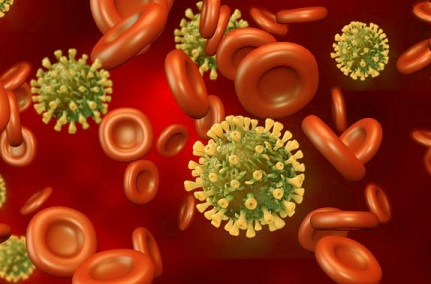Study reveals key differences in blood clotting responses between COVID-19 and non-COVID sepsis patients
Sebastian Lavoie Fact checked by:Thailand Medical News Team Sep 03, 2024 6 months, 4 weeks, 7 hours, 37 minutes ago
Medical News: Understanding the Complexities of Sepsis and Blood Clotting
Sepsis, a life-threatening condition caused by the body's overwhelming response to infection, is often complicated by severe blood clotting abnormalities. These complications, known as sepsis-associated coagulopathy, significantly increase the risk of mortality. In a recent study conducted by researchers from the University Hospital Bonn and the University Hospital Heidelberg in Germany, critical insights have been gained into the differences between blood clotting responses in patients with COVID-19-induced sepsis and those with sepsis due to other infections. This
Medical News report delves into the findings of this study, shedding light on how COVID-19 may uniquely impact blood clotting mechanisms compared to non-COVID sepsis.
 Study reveals key differences in blood clotting responses between COVID-19
Study reveals key differences in blood clotting responses between COVID-19
and non-COVID sepsis patients
The Focus of the Study: The Protein C Pathway
The study specifically investigated the functionality of the Protein C (PC) pathway, a critical anticoagulant system in the body that helps regulate blood clotting. The PC pathway's impairment is believed to contribute to the increased risk of blood clots in sepsis patients. The researchers aimed to compare the activity of this pathway in patients with COVID-19 sepsis and those with non-COVID sepsis, as well as in healthy controls.
Study Design and Participant Details
The study was conducted from December 2015 to January 2023, involving three distinct groups: 30 patients with COVID-19-induced sepsis, 47 patients with sepsis due to other infections, and 40 healthy controls. The COVID-19 patients were recruited during the second wave of the pandemic in Germany, which was marked by a high number of severe cases. The study emphasizes the importance of the timing and setting of the study, as the pandemic presented unique challenges and characteristics that likely influenced the findings.
Key Findings: Elevated Thrombin and APC Levels
One of the critical discoveries of the study was that both COVID-19 and non-COVID sepsis patients exhibited significantly higher levels of thrombin and activated Protein C (APC) compared to healthy controls. Thrombin is an enzyme that plays a central role in blood clotting, while APC acts as a natural anticoagulant, preventing excessive clot formation. The study found that thrombin levels were up to six times higher in COVID-19 patients and nearly five times higher in non-COVID sepsis patients than in healthy controls. Similarly, APC levels were elevated in both groups of sepsis patients, although the increase was more pronounced in the non-COVID sepsis group.
Comparative Analysis: COVID-19 vs. Non-COVID Sepsis
When comparing the two sepsis groups, the study revealed that patients with COVID-19 sepsis had a relatively lower APC response to thrombin generation than those with non-COVID sepsis. This reduced response was particularly evident when the researchers ad
justed for the levels of Protein C in the blood. The ratios of APC to thrombin, APC to prothrombin fragment 1+2 (F1+2), and APC to thrombin-antithrombin complex (TAT) were significantly lower in the COVID-19 group, indicating a diminished ability of the endothelium (the inner lining of blood vessels) to activate Protein C in response to thrombin formation.
The Role of Endothelial Dysfunction in COVID-19 Sepsis
The findings suggest that endothelial dysfunction, a condition where the blood vessels' inner lining becomes damaged, may play a significant role in the impaired APC response observed in COVID-19 sepsis. This dysfunction could be linked to the virus's direct effects on the endothelium, as well as the intense inflammatory response triggered by the infection. The study provides evidence that this impaired response could contribute to the prothrombotic (clot-forming) phenotype observed in COVID-19 patients, setting them apart from those with non-COVID sepsis.
Implications for Treatment: The Importance of Anticoagulation
Given the study's findings, the role of anticoagulation (blood-thinning) therapy in managing COVID-19 sepsis becomes even more critical. The researchers highlight that anticoagulant and anti-inflammatory treatments may be particularly beneficial in these patients, helping to mitigate the risk of dangerous blood clots. The study also raises questions about whether the cytoprotective (cell-protecting) effects of APC could be harnessed to counteract thrombotic complications in COVID-19, especially considering its potential to reduce inflammation through specific signaling pathways.
Limitations and Future Directions
While the study provides valuable insights, it is not without limitations. The researchers acknowledge that the sample size was relatively small, and the cross-sectional design means that the findings represent a snapshot in time rather than a longitudinal (over time) analysis. Additionally, the study's stimulation approach in healthy volunteers, while useful, is not a perfect model for the complex coagulation changes seen in sepsis patients. Despite these limitations, the study's results offer a foundation for future research, particularly in exploring the direct assessment of endothelial cell dysfunction in sepsis patients.
Conclusions: A Step Forward in Understanding Sepsis
In conclusion, this study underscores the distinct differences in blood clotting responses between COVID-19 and non-COVID sepsis patients. The findings suggest that COVID-19 sepsis is characterized by a prothrombotic phenotype, driven by an impaired APC response to thrombin generation, likely due to endothelial dysfunction. These insights not only enhance our understanding of the mechanisms underlying COVID-19-associated coagulopathy but also point to potential avenues for targeted therapies. As the medical community continues to grapple with the complexities of COVID-19, studies like this one are crucial in informing effective treatment strategies.
The study findings were published in the peer-reviewed journal: Biomedicines.
https://www.mdpi.com/2227-9059/12/9/1982
For the latest COVID-19 News, keep on logging to Thailand
Medical News.
Read Also:
https://www.thailandmedical.news/news/how-bacterial-and-viral-infections-covid-19-trigger-different-immune-responses-in-sepsis
https://www.thailandmedical.news/news/macrophages-play-a-role-in-causing-endothelial-cell-dysfunction-in-sepsis
